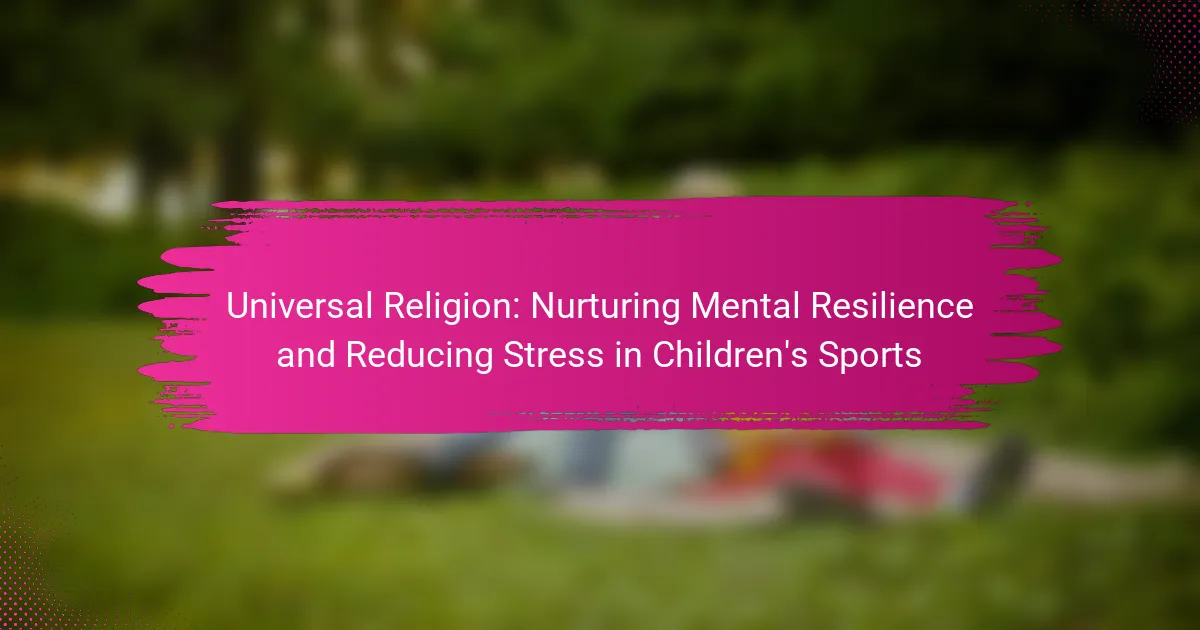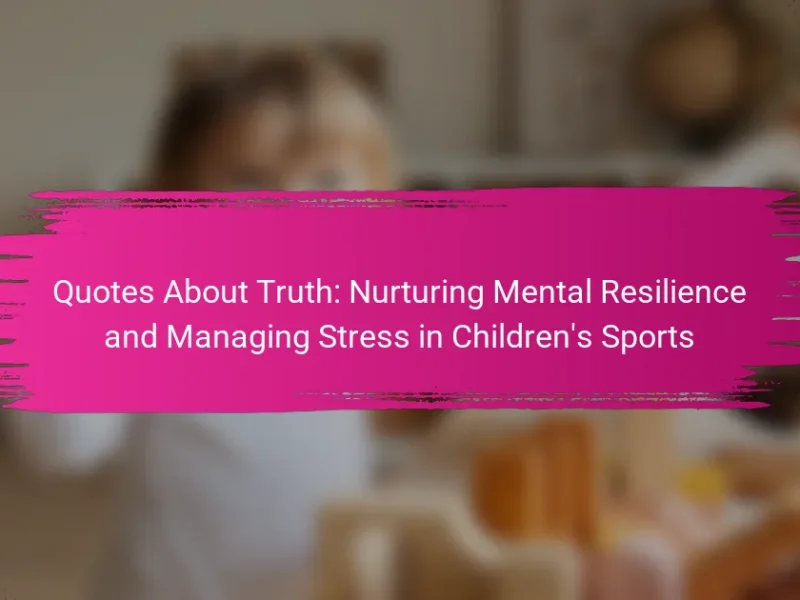Nurturing mental resilience in children’s sports is essential for their development and performance. Universal religion fosters community, emotional support, and discipline. It promotes resilience, teamwork, and effective stress management strategies. Mindfulness practices further enhance focus and emotional regulation, enabling children to thrive in competitive environments.

What is the role of universal religion in nurturing mental resilience in children’s sports?
Universal religion plays a crucial role in nurturing mental resilience in children’s sports by fostering a sense of community and shared values. It promotes emotional support, helping children cope with stress and setbacks. Engaging in universal religious practices can enhance focus and discipline, essential traits for athletes. Moreover, teachings from various religions often emphasize perseverance and inner strength, which are vital for overcoming challenges in competitive environments. Such principles can lead to improved performance and a healthier approach to sportsmanship among young athletes.
How does mental resilience impact children’s performance in sports?
Mental resilience significantly enhances children’s performance in sports by improving focus, reducing anxiety, and fostering a positive mindset. Resilient children adapt better to challenges, leading to improved outcomes in competitive environments. Studies indicate that mental resilience correlates with higher levels of self-efficacy, which can boost athletic performance. Furthermore, nurturing mental resilience through supportive coaching and positive reinforcement can cultivate a lifelong appreciation for sports and physical activity.
What are the common stressors faced by children in sports?
Children in sports commonly face stressors such as performance pressure, parental expectations, and competition. These factors can significantly impact their mental resilience. Performance pressure often stems from the desire to excel, while parental expectations may lead to anxiety about meeting standards. Competition can create an environment where fear of failure prevails, affecting children’s enjoyment and overall well-being. Addressing these stressors through supportive coaching and open communication can foster healthier sports experiences.
What psychological factors contribute to stress in young athletes?
Psychological factors such as pressure to perform, fear of failure, and high expectations contribute significantly to stress in young athletes. These elements can lead to anxiety and burnout, impacting their mental resilience. For instance, the pressure from parents and coaches often amplifies these feelings, creating an environment where young athletes may struggle to enjoy their sport. Furthermore, a lack of coping strategies can exacerbate stress levels, making it essential to nurture mental resilience through supportive practices.
How do external pressures affect children’s sports experience?
External pressures can significantly hinder children’s sports experiences by increasing stress and anxiety. Factors such as parental expectations, peer competition, and societal norms contribute to this pressure. Children may feel compelled to perform at high levels, which can lead to burnout and decreased enjoyment. Research indicates that fostering a supportive environment can enhance mental resilience, allowing children to navigate these pressures effectively. By emphasizing personal growth and enjoyment over competition, caregivers can help children develop a healthier relationship with sports.

What universal attributes support mental development in children’s sports?
Universal attributes that support mental development in children’s sports include resilience, teamwork, and stress management. These attributes foster emotional intelligence and coping strategies. Resilience helps children bounce back from setbacks, while teamwork encourages social skills and collaboration. Stress management techniques reduce anxiety, enhancing overall performance. Engaging in sports promotes a growth mindset, allowing children to embrace challenges and learn from failures.
How can teamwork foster mental resilience?
Teamwork enhances mental resilience by fostering a supportive environment for children in sports. Collaborative efforts cultivate trust, communication, and shared goals, which are essential attributes for resilience. Studies show that children engaged in team sports experience lower stress levels and improved emotional well-being. This unique interaction not only builds social skills but also instills a sense of belonging, further strengthening mental fortitude. As a result, teamwork serves as a foundational element in nurturing resilience among young athletes.
What role does positive reinforcement play in reducing stress?
Positive reinforcement significantly reduces stress by enhancing children’s confidence and motivation in sports. This approach fosters a supportive environment, encouraging perseverance and resilience. Studies show that children receiving positive feedback exhibit lower anxiety levels and improved performance. By focusing on strengths, positive reinforcement creates a constructive cycle, promoting mental well-being and reducing stress during competitive activities.
How does physical activity correlate with mental well-being?
Physical activity significantly enhances mental well-being by promoting resilience and reducing stress. Engaging in sports fosters teamwork, discipline, and self-esteem in children, contributing to their emotional stability. Research indicates that regular participation in physical activities can decrease anxiety and depression symptoms. Additionally, physical exercise releases endorphins, which are natural mood lifters. In children’s sports, these benefits are amplified through social interactions and skill development.

What unique attributes differentiate effective mental resilience strategies?
Effective mental resilience strategies focus on adaptability, emotional regulation, and positive reinforcement. Unique attributes include personalized approaches, cultural relevance, and the integration of mindfulness practices. These aspects foster a supportive environment, enhancing children’s ability to cope with stress in sports. Engaging in community-based rituals can strengthen these strategies, promoting a sense of belonging and shared values.
How do cultural perspectives on sports influence mental resilience?
Cultural perspectives on sports significantly enhance mental resilience in children by fostering community support and emphasizing teamwork. These cultural values shape how children perceive challenges and setbacks, encouraging perseverance. For instance, cultures that prioritize collective achievement often instill a sense of belonging, which can buffer stress. Additionally, sports traditions that celebrate effort over outcome teach children to value growth, reinforcing resilience. Ultimately, these cultural influences cultivate a mindset that embraces adversity as an opportunity for personal development.
What specific coaching techniques enhance mental development?
Coaching techniques that enhance mental development include mindfulness training, cognitive restructuring, and goal-setting strategies. These methods foster mental resilience and reduce stress in children’s sports. Mindfulness training improves focus and emotional regulation. Cognitive restructuring promotes positive thinking patterns. Goal-setting strategies encourage motivation and a sense of achievement.
What role do role models play in shaping young athletes’ mental health?
Role models significantly influence young athletes’ mental health by providing guidance, motivation, and a framework for resilience. They exemplify coping strategies and positive behaviors, which can reduce stress and enhance performance. Research indicates that athletes with supportive role models experience lower anxiety levels and improved self-esteem. This connection fosters a sense of belonging, encouraging children to embrace challenges and develop mental toughness. Role models can also help young athletes navigate failures, reinforcing the idea that setbacks are part of growth.

What rare attributes can enhance stress management in children’s sports?
Mindfulness practices can enhance stress management in children’s sports. Techniques such as focused breathing, visualization, and body awareness foster mental resilience. These rare attributes promote emotional regulation, improve concentration, and reduce anxiety during competitive events. Implementing these practices can lead to better performance and enjoyment in sports.
How can individualized mental training programs benefit young athletes?
Individualized mental training programs can significantly enhance young athletes’ performance and well-being. These programs foster mental resilience and reduce stress, enabling athletes to cope with competition pressures effectively.
Tailored approaches address unique psychological needs, promoting focus and self-confidence. Research indicates that athletes who engage in mental training demonstrate improved concentration and reduced anxiety levels. Additionally, these programs can enhance emotional regulation, allowing young athletes to navigate challenges more effectively.
Incorporating mindfulness practices into training can further support mental health. Studies show that mindfulness techniques lead to better stress management and overall satisfaction in sports. As a result, individualized mental training programs not only improve athletic performance but also contribute to the holistic development of young athletes.
What innovative practices are emerging in youth sports for mental resilience?
Innovative practices in youth sports focus on fostering mental resilience through mindfulness, emotional intelligence training, and collaborative team-building activities. These approaches enhance children’s ability to cope with stress and setbacks. Mindfulness techniques, such as breathing exercises, help athletes remain present and focused. Emotional intelligence programs teach kids to recognize and manage their emotions, improving their interpersonal skills. Collaborative activities promote teamwork, encouraging a supportive environment that nurtures resilience. Overall, these practices are reshaping how young athletes approach challenges in sports.

What actionable strategies can parents implement to support mental development?
To support mental development, parents can implement strategies that foster resilience and reduce stress during children’s sports. Encourage open communication about feelings, set realistic expectations, and promote a growth mindset.
Additionally, create a supportive environment by emphasizing effort over outcome, providing consistent feedback, and modeling healthy coping mechanisms. Engage in activities that build confidence, such as team sports or individual challenges, to enhance social skills and emotional regulation.
Incorporate mindfulness practices to help children manage anxiety and focus better during competition. Lastly, ensure a balanced schedule that includes time for rest and play, which is essential for overall mental well-being.
How can parents effectively communicate with young athletes about stress?
Parents can effectively communicate with young athletes about stress by fostering open dialogue and understanding. Encourage athletes to express their feelings and concerns about competition. Use active listening to validate their emotions and provide reassurance. Teach coping strategies such as deep breathing or visualization techniques to manage stress. Establish a supportive environment where athletes know their well-being is prioritized over performance. Regular check-ins can help maintain this communication, ensuring that young athletes feel comfortable discussing their experiences.
What are the best practices for creating a supportive sports environment?
Creating a supportive sports environment involves fostering mental resilience and reducing stress in children. Key practices include promoting positive reinforcement, encouraging teamwork, and prioritizing mental well-being.
Positive reinforcement builds confidence and motivation. Coaches should acknowledge effort and improvement rather than just outcomes. Teamwork fosters camaraderie, helping children feel connected and supported. This social aspect reduces stress and enhances enjoyment.
Prioritizing mental well-being means integrating relaxation techniques and mindfulness practices into training. Providing resources for stress management helps children develop coping strategies. Regular check-ins with young athletes can identify emotional challenges early.
Lastly, creating an inclusive atmosphere where every child feels valued is essential. This unique attribute cultivates a sense of belonging, further enhancing their overall experience in sports.
What common mistakes should parents avoid in nurturing their child’s sports journey?
Parents should avoid overemphasizing winning, neglecting emotional support, and pressuring their child excessively. These common mistakes can hinder a child’s mental resilience and enjoyment in sports.
Focusing solely on outcomes can create stress, detracting from the learning experience. Emotional support fosters resilience, allowing children to navigate challenges effectively. Excessive pressure can lead to burnout, diminishing their passion for the sport.
Encouraging a balanced approach promotes a healthier sports journey. Prioritizing enjoyment and personal growth enhances a child’s overall development in athletics.
How can parents collaborate with coaches to enhance mental resilience?
Parents can collaborate with coaches to enhance mental resilience by maintaining open communication, setting shared goals, and supporting a positive environment. Regular meetings allow parents to understand coaching strategies and reinforce them at home. Encouraging athletes to express their feelings helps build emotional strength. Coaches can provide parents with resources on mental resilience techniques, ensuring consistency between training and home life. This partnership fosters a supportive atmosphere that emphasizes growth, perseverance, and stress management in children’s sports.


